China has provided assistance to over 130 countries and international organizations to fight the coronavirus pandemic, the Chinese Foreign Ministry said on Friday, as total confirmed cases of COVID-19 around the world jumped to more than 1.6 million, according to a Johns Hopkins University tally.
Foreign Ministry spokesman Zhao Lijian said such efforts demonstrate concept of a community with a shared future for mankind.
It has sent face masks, protective suits, test kits to 127 countries and four international organizations, 13 medical teams to 11 countries and held over 70 video conferences sharing experience and data with more than 150 countries and regions as well as international organizations, Zhao noted.
Expressing sympathy, China's local governments, companies and organizations have donated medical supplies to over 100 countries, he added.
Speaking of commercial procurement, Zhao said 58 countries and regions as well as four international organizations have signed contracts with Chinese manufacturers.
From March 1 to April 4, China exported medical supplies including 3.86 billion face masks, 37.52 million protective suits, 2.41 million thermometers, and 16,000 ventilators, 2.84 million test kits and 8.41 million pairs of protective glasses, worth a total of 10.2 billion yuan (1.4 billion U.S. dollars), according to China Custom.
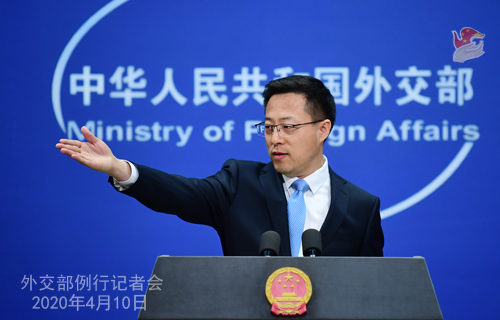
China's Foreign Ministry spokesman Zhao Lijian /China's Ministry of Foreign Affairs
China's Foreign Ministry spokesman Zhao Lijian /China's Ministry of Foreign Affairs
Asked about China's donation to the Vatican – the two countries have no formal diplomatic relation – Zhao said viruses respect no border, race nor religion, and the coronavirus is the common enemy of humanity.
The supplies sent by the Red Cross Society of China have arrived in Vatican, he said, adding that China is willing to provide more assistance to the Vatican to help combat COVID-19.
Speaking of the mixed reactions of Chinese doctors' arrival in Nigeria, Zhao said China sent the medic team as a response to the Nigerian government's request.
Earlier, some local doctors opposed the visit, saying inviting people from "the hotbed of the plague" could worsen the coronavirus outbreak in Nigeria.
The virus has led to some 288 confirmed infections and seven deaths in the most populous nation in Africa.
The visit is under the request of the Nigerian government, the spokesman stressed, adding that the Nigerian government had voiced welcome and gratitude to China's help.
The flight also carried medicines and equipment, including test kits, ventilators, disinfectants, and protective face masks, Zhao noted.
They will stay there for one month to help fight against the coronavirus, he added.
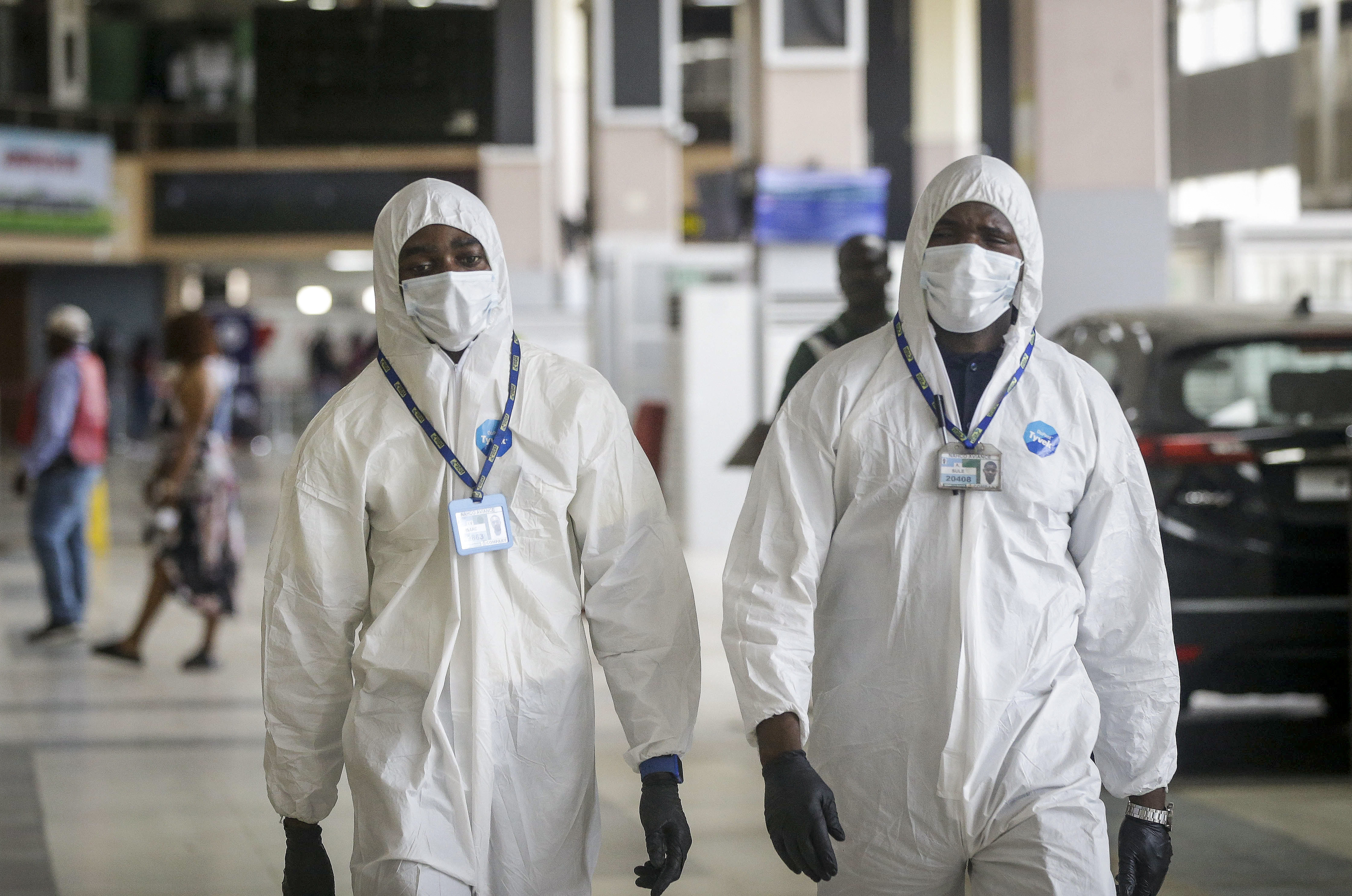
Nigerian aviation workers wear protective clothing as U.S. citizens queue to check in and be repatriated aboard an evacuation flight arranged by the U.S. embassy and chartered with Delta Air Lines, at the Murtala Mohammed International Airport in Lagos, Nigeria, April 7, 2020. /AP
Nigerian aviation workers wear protective clothing as U.S. citizens queue to check in and be repatriated aboard an evacuation flight arranged by the U.S. embassy and chartered with Delta Air Lines, at the Murtala Mohammed International Airport in Lagos, Nigeria, April 7, 2020. /AP
China-Arab League cooperation
Chinese and Arab medical experts held on Thursday a video conference hosted by the Cairo-based Arab League (AL) to share experience and expertise on the ways to combat COVID-19.
The conference was attended by 14 Arab experts representing the health ministries of their countries, and Chinese officials and experts from the Ministry of Science and Technology, Ministry of Foreign Affairs, China's National Health Commission, Chinese Center for Disease Control and Prevention, Chinese Academy of Medical Sciences and Peking University First Hospital.
Zhao highlighted the meeting at Friday's daily briefing, saying China answered over 50 questions regarding the treatment and controlling the virus during a three-hour meeting.
"The Chinese side said that their country is completely ready to provide advice and consultation on the novel coronavirus and the methods of its treatment and prevention, either orally or through the video conference technology," said AL Assistant Secretary General for Social Affairs Haifa Abu-Ghazaleh, who led the discussion.
She said that extensive discussions were held among the experts in the fields of prevention, diagnose and treatment of the novel coronavirus infection, as well as the pandemic's impacts in health, economic and social aspects.
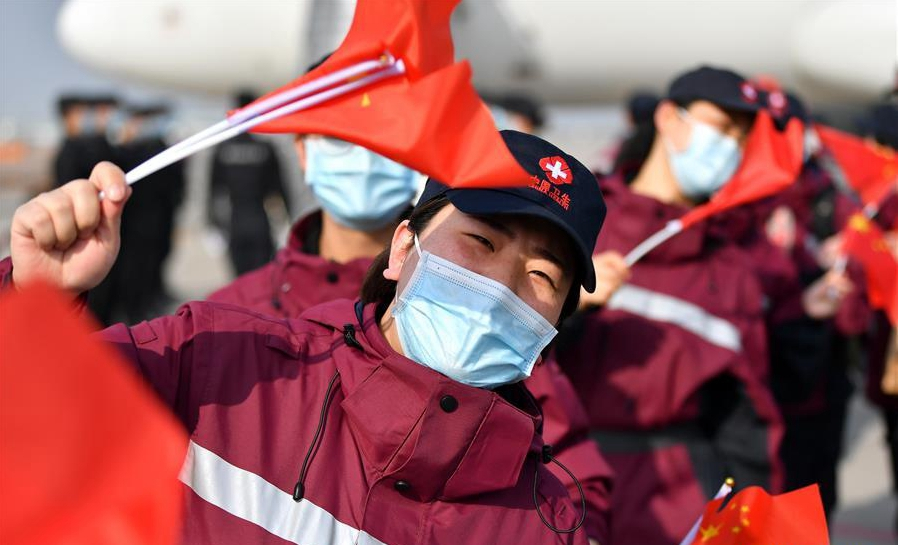
File photo of Chinese medical workers. /Xinhua
File photo of Chinese medical workers. /Xinhua
Read more:
Maduro thanks China for helping Venezuela fight the virus
China ready to send more help to Bangladesh over COVID-19: FM
The exchange will help participants help their countries create their own road map to fight the coronavirus through international cooperation, Abu-Ghazaleh said, adding that she hopes that more conferences like this could be organized in the future.
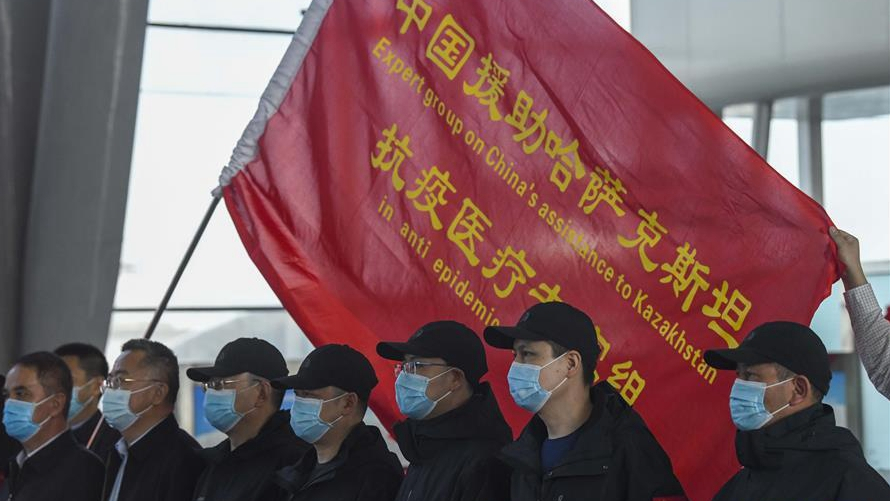
A Chinese medical team leaves for Kazakh capital Nur-Sultan to assist Kazakhstan's ongoing efforts in fight against COVID-19, April 9, 2020. /Xinhua
A Chinese medical team leaves for Kazakh capital Nur-Sultan to assist Kazakhstan's ongoing efforts in fight against COVID-19, April 9, 2020. /Xinhua
Chinese medical team arrives in Kazakhstan with supplies
Also on Thursday, a Chinese medical team arrived in the Kazakh capital Nur-Sultan to assist Kazakhstan's ongoing efforts in fight against COVID-19.
The 10-member team also brought medical supplies including 4,800 N95 face masks, 49,600 disposable surgical masks, 2,000 protection suits, two ventilators and medicines.
The team includes experts from the Xinjiang Uygur Autonomous Region in the fields of infectious control and prevention of respiratory and severe diseases as well as clinic treatment.
Read more:
China vows to enhance COVID-19 cooperation with countries including Netherlands
China's successful COVID-19 experience worth learning: WHO official
"All the team members are with firsthand experiences in treating COVID-19 patients or controlling the epidemic," said deputy team leader Lu Chen, who is also vice president of People's Hospital of the Xinjiang Uygur Autonomous Region.
"The major experience from China's battle against the COVID-19 can be referred as 'four concentrations,' namely the concentration of patients, hospitals, experts and treatment. We will unreservedly share our experience with Kazakh counterparts," said Lu Chen.

A Chinese medical team leave for Kazakh capital Nur-Sultan to assist Kazakhstan's ongoing efforts in fight against COVID-19, April 9, 2020. /Xinhua
A Chinese medical team leave for Kazakh capital Nur-Sultan to assist Kazakhstan's ongoing efforts in fight against COVID-19, April 9, 2020. /Xinhua
Kazakh Deputy Health Minister Kamalian Nadyrov said that China's experience in treating COVID-19 patients and conducting epidemiological investigation is very important. "We are carefully studying experience of our international colleagues. I am sure that the discussion (with Chinese experts) will be very useful," said Nadyrov.
"This is the first Chinese medical team dispatched to Central Asia to fight against COVID-19," said Zhang Xiao, Chinese ambassador to Kazakhstan who greeted the Chinese experts at the airport. "A true friend is known in the day of adversity. China will never forget Kazakh aid sent two months ago when China was badly hit by the virus. The mutual support shines the permanent comprehensive strategic partnership between China and Kazakhstan."
Kazakh Deputy Foreign Minister Yerzhan Ashikbayev said the dispatch of a Chinese medical team is a part of efforts to implement the consensus reached between leaders of the two countries. "Kazakhstan is supported not only by the central Chinese government, but also by the regional authorities. Many Chinese companies, large or small, are contacting our diplomats in China and show their goodwill to provide assistance," said Ashikbayev.
The Chinese medical team will stay in Kazakhstan for 15 days, in the cities of Nur-Sultan, Almaty and Karaganda.
Kazakhstan reported 781 confirmed COVID-19 cases and eight deaths as of Thursday.
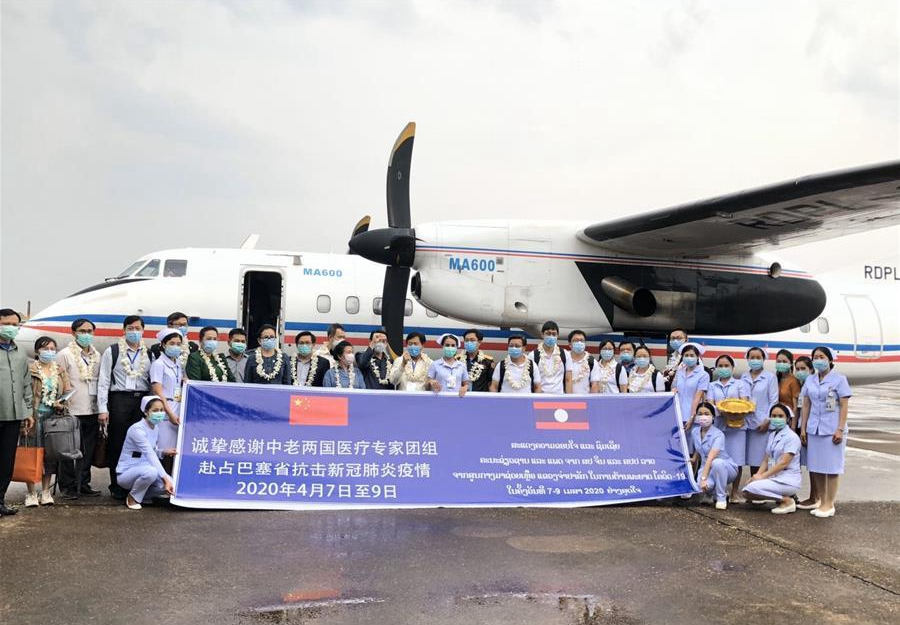
Members of the Chinese anti-epidemic medical expert team pose for a group photo with local people before boarding a Lao military aircraft to capital Vientiane, in southern Laos' Pakse airport, April 9, 2020. /Xinhua
Members of the Chinese anti-epidemic medical expert team pose for a group photo with local people before boarding a Lao military aircraft to capital Vientiane, in southern Laos' Pakse airport, April 9, 2020. /Xinhua
Chinese experts share anti-epidemic experiences with Lao peers
The Chinese anti-epidemic medical team, divided into two groups, has been sharing anti-epidemic experiences with local governments and medical staff in Laos' southern and northern hubs of Pakse and Luang Prabang from Tuesday to Thursday.
In the provincial hospital laboratory, the Chinese experts trained testing personnel on standard operating procedures and specimen sampling. In the provincial health department, the team communicated with officials on epidemic prevention and control, public places's disinfection, epidemiological investigations, and management of high-risk groups, and proposed improvement measures.
Likewise, in Laos' northern hub Luang Prabang, some 220 km north of Vientiane, the Chinese doctors participated in epidemic prevention seminars of eight northern Lao provinces, trained the local medical staff and answered questions on COVID-19 diagnosis and treatment.
The team also trained the local lab staff on personal preventive equipment dressing and held a symposium with relevant representatives of the Lao Health Ministry and of the eight northern Lao provincial health departments.
Laos detected its first two confirmed COVID-19 cases on March 24, and only after five days, the Chinese anti-epidemic medical expert team arrived in capital Vientiane on March 29.
(With input from Xinhua)